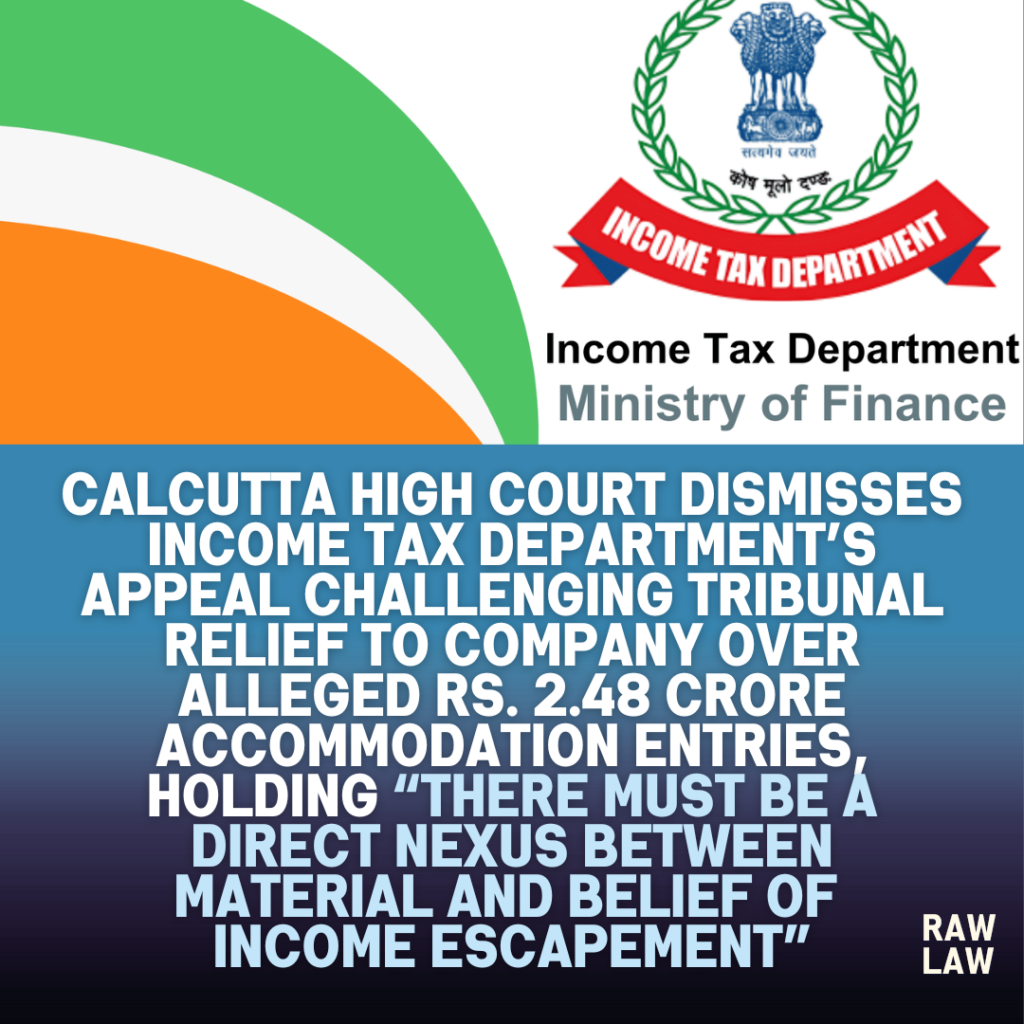Court’s Decision
The Calcutta High Court dismissed the Income Tax Department’s appeal challenging the Income Tax Appellate Tribunal’s order granting relief to the assessee in reassessment proceedings alleging receipt of Rs. 2.48 crore through accommodation entries. The Court held there was no substantial question of law involved as the reasons for reopening lacked a direct nexus with the alleged transaction, affirming the tribunal’s finding that the proceedings were without factual foundation.
Facts
The assessee filed its return for AY 2012-13 declaring a loss of Rs. 74,252, which was initially assessed under Section 143(3) with additions of share capital, raising assessed income to over Rs. 79 crore. Later, the CIT invoked Section 263 directing a de novo assessment, leading to a revised assessment reducing income. A second Section 263 revision was initiated ex parte, during which reassessment proceedings under Sections 147 and 148 commenced based on alleged information of Rs. 2.48 crore received as accommodation entries through Sandeep Roy of Sarika Trading Co. The assessee denied the transactions, submitted documentation, and filed objections which were not disposed of. Subsequent assessments again added the entire share capital. The tribunal quashed these actions, and the department challenged the tribunal’s order before the High Court.
Issues
- Whether the tribunal erred in quashing reassessment proceedings under Sections 147/148 based on alleged accommodation entries without proper factual foundation.
- Whether the reasons recorded for reopening the assessment under Section 147 had a rational nexus with the alleged income escapement.
- Whether the department could invoke Section 263 repeatedly for the same issues.
Petitioner’s Arguments
The department argued that the tribunal erred in dismissing its appeal without adjudicating the merits, that the reassessment under Section 147 was based on different grounds from the earlier Section 263 proceedings, and that the tribunal improperly relied on SM Overseas Pvt Ltd v. CIT. It asserted that the reopening was justified due to information about the alleged accommodation entry of Rs. 2.48 crore.
Respondent’s Arguments
The assessee argued that the reopening was invalid as the reasons lacked any specific mention of the assessee, no clear link was shown between the alleged accommodation entry and the assessee, and all details had already been submitted and verified by the Assessing Officer during earlier proceedings. The assessee contended that repeated proceedings under Section 263 and the reassessment violated principles of finality and fair procedure.
Analysis of the Law
The Court examined the requirement under ITO v. Lakhmani Mewal Das (1976) 103 ITR 437 (SC) that there must be a rational connection between material information and the belief of income escapement. It reiterated that reopening under Section 147 requires a direct nexus with the alleged escapement and cannot be based on vague or general information.
Precedent Analysis
The Court relied on:
- ITO v. Lakhmani Mewal Das (1976) 103 ITR 437 (SC): requiring a live link between material and belief of escapement.
- Its own decision in PCIT-18 Kolkata v. Prasant Desai (2025): where reopening was invalidated due to lack of specific allegations and layering evidence.
- Distinguished SM Overseas Pvt Ltd v. CIT, noting that the tribunal rightly applied precedents relevant to the facts.
Court’s Reasoning
The Court found that the reasons recorded for reopening did not specifically implicate the assessee, lacked details on how funds were layered, and did not clarify the nature of the transaction (whether income, expenses, capital, or loan). It noted that the assessee had produced books of accounts and bank statements disproving the alleged transactions. The repeated proceedings under Section 263 were deemed unjustified, and the tribunal’s decision to grant relief was upheld.
Conclusion
The High Court held that the tribunal rightly granted relief to the assessee as there was no substantial question of law, dismissing the department’s appeal. The connected interim application was also disposed of.
Implications
- Clarifies that reassessment under Section 147 requires a clear, direct nexus with material indicating escapement of income.
- Reinforces protection against repeated reassessment and revision on the same issues without new material evidence.
- Emphasises adherence to procedural fairness, ensuring taxpayers are not subjected to multiple proceedings on the same grounds.
Cases Referred
- ITO v. Lakhmani Mewal Das (1976) 103 ITR 437 (SC): Held that there must be a direct nexus between the material and belief of income escapement.
- PCIT-18 Kolkata v. Prasant Desai (2025): Invalidated reopening in similar facts due to lack of specific allegations.
- SM Overseas Pvt Ltd v. CIT (450 ITR 1 SC, 2022): Distinguished, not applicable to the facts of this case.
FAQs
Q1: Can the income tax department reopen assessments without direct evidence linking the assessee to alleged accommodation entries?
No, the High Court has clarified that reopening requires a direct nexus between the alleged information and the assessee.
Q2: Is the department allowed to invoke Section 263 repeatedly for the same assessment year and issues?
No, repeated invocation of Section 263 on the same issues without new material evidence is not permissible.
Q3: What is required to justify reopening of assessments under Section 147?
There must be specific, relevant material with a live link indicating income escapement directly linked to the assessee.
